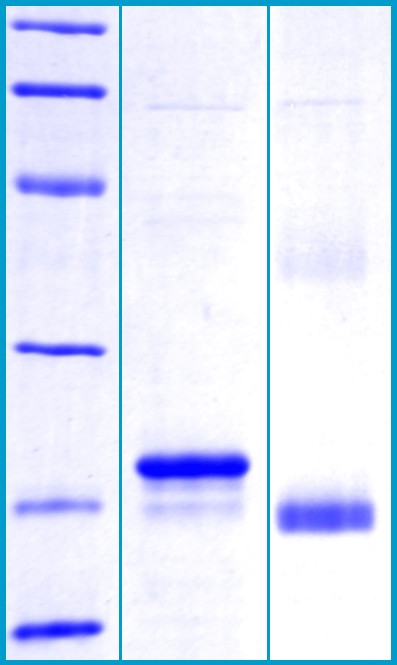Type
Recombinant protein
Description
Total 185 AA. MW: 20.68 kDa (calculated). UniProtKB acc.no. O75594 (Gln22-Pro196). N-terminal His-tag (10 extra AA). Protein identity confirmed by MS.
Amino Acid Sequence
MKHHHHHHASQETEDPACCSPIVPRNEWKALASECAQHLSLPLRYVVVSHTAGSSCNTPASCQQQARNVQHYHMKTLGWCDVGYNFLIGEDGLVYEGRGWNFTGAHSGHLWNPMSIGISFMGNYMDRVPTPQAIRAAQGLLACGVAQGALRSNYVLKGHRDVQRTLSPGNQLYHLIQNWPHYRSP
Source
E. coli
Purity
˃ 90 % by SDS-PAGE
SDS-PAGE Gel
14% SDS-PAGE separation of Human PGRP-1:
1. M.W. marker – 97, 66, 45, 31, 21, 14 kDa
2. reduced and heated sample, 2.5 μg/lane
3. non-reduced and non-heated sample, 25 μg/lane
Endotoxin
< 1.0 EU/µg
Formulation
Filtered (0.4 μm) and lyophilized in 0.5 mg/mL in 0.05 M Acetate buffer pH=4.0
Reconstitution
Add 200μl of 0.1M Acetate buffer pH=4.0 to prepare a working stock solution of 0.5 mg/mL and let the lyophilized pellet dissolve completely at 37°C. For conversion into higher pH value, we recommend intensive dilution by relevant buffer to a concentration of 10μg/mL. In higher concentrations the solubility of this antigen is limited.
Applications
Western blotting, ELISA
Shipping
At ambient temperature. Upon receipt, store the product at the temperature recommended below.
Storage/Expiration
Store the lyophilized protein at -80 °C. Lyophilized protein remains stable until the expiry date when stored at -80 °C. Aliquot reconstituted protein to avoid repeated freezing/thawing cycles and store at -80 °C for long term storage. Reconstituted protein can be stored at 4 °C for a week.
Quality Control Test
BCA to determine quantity of the protein.
SDS PAGE to determine purity of the protein.
Endotoxin level determination.
Note
This product is intended for research use only.

